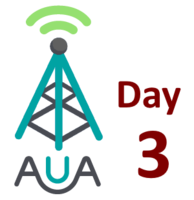AUA Telecoms Conference 2011 - Day 1
18 Jan 2011This year sees the 24th annual AUA Telecoms conference being held in Manchester. It is a conference where telecoms managers and engineers get together to look at the telecoms in the UK Higher Education sector. I’m predominantly focussed on the IT side of things at work, but with the prevailing convergence of telecoms technologies and IT it is becoming ever more important for me to better understand the whole ICT sphere and so this was an opportunity I didn’t really want to pass up.
The event started kicked off in earnest this afternoon with a Q&A session where delegates used an Optivote RF system of remote controls to vote on answers to a number of questions. This has been done the last few years and several of the results caused some ripples in the audience as some shifts were noted as well as some general agreements. For me it was particularly interesting to see that most telecoms and IT departments were closely aligned and that surprisingly not everyone was as far along with IP based telephony (never mind unified communications) as I had imagined.
After the Q&A session the floor was opened up to the conference exhibitors. Each was given a five minute slot to explain who they were and what they offered in terms of products and services. There were a few consultancies and a few call logging systems as well as providers for managed telecoms services. There were some interesting approaches to the presentations with some using slides and others just delivering a stand up talk. There was even one presentation that involved playing Buzzword Bingo for six bottles of wine. Whilst I think it went down well I seemed to be one of very few people who were listening to what they were pitching rather than focussing on finding occasional words on the bingo grid - personally I’m not sure that was a great way to get a message across, but maybe it will get lots of people talking about them. I jotted down a couple of companies to go and speak to, but so far they’ve been too popular to speak to in the breakout sessions.
After the epic run of exhibitor pitches and a quick comfort break Gordon Ross of Cambridge University provided a run down of his experiences with developing a different administrative front end to manage aspects of a phone system and about some lessons learnt and experiences of deploying an IPT compatible voice mail component for a large user base. I found the discussions enlightening and I have some thoughts to take away on telecoms system structures and resilience.
Finally the day wrapped up with a session from one of the exhibitors - Nigel Tazzyman from Trust Consulting with a talk entitled “Unified Communication … the hype, the reality and the options”. This was a session I was really interested in as unified communications will be something I hope to be looking at in more detail over the course of the coming months.
Nigel took the discussion from the base level of “What is Unified Communications?” and discussed different people’s perceptions (though I would have liked to have seen a consensus) through understanding that you need to identify the right business drivers at the start (as you might expect) and on to the sorts of things that suppliers will say to you and then trying to pick it apart to understand what that means in reality.
There were a number of interesting points raised in this part of the discussion such as the fact that most HE staff don’t travel much so the potential to reduce travel costs is typically not as great as in other areas of the public sector. That being said I wonder if the greater decentralisation of HE from single site campuses and the increased demands on e-learning simply mean that there is a different scale of distance travel savings and rather it is more an aggregation of many small time savings?
One of the key points that Nigel did put across particularly well was the need to embed unified communications into the business processes. This is known as CEBP - Communications Enabled Business Processes … which made me chuckle as I wondered how effective a business process would be if it was not communications enabled. I think perhaps there needs to be a silent ‘U’ on this acronym to infer the benefit of embedding unified communications specifically.
Nigel also discussed points around design, integration, collaborating between areas to deliver the solution and finally about assessing and realising the benefits. It was suggested that because IP telephony had originally been forecast to be fully embedded at this point an it obviously isn’t that we might expect the same of unified communications. This last point is not one I agree with. Obviously Nigel is a consultant in the industry so take my thoughts with a grain of salt, but I’ll try and explain why I don’t think this is the case.
I think that the rate of technology growth has increased dramatically in the global communications arena over the last few years with the integration of more social networking and smart mobile technologies into people’s lives. The always on, always connected world is here today and unified communications for me is something that will develop to bind these elements together. There can be little doubt that the expectations of workers will soon be that they must have flexible systems that can be fused together and automatically adapt to their communications requirements; that are location aware and simple to use. If organisations don’t seek to implement these technologies now it is likely that users will introduce their own consumer solutions … which then lead to other issues such as security and manageable service. So rather than having a slow adoption I think there will be a rapid on take when the unified communications technology develops to the point where it can link all communication channels with presence and adaptive communication routing.
The final point of the presentation oriented around being patient with the rate of return on unified communications. Organisations are beginning to realise that the returns on unified communications are a bit of a slow burner as cultures are still developing the best ways of utilising the services available.
Overall the first day has been useful and I’ve certainly ticked off at least one of my boxes around some discussions around unified communications so here’s hoping that the second day will tick a few more of those boxes.
 Scroll the menu to find all the places to visit
Scroll the menu to find all the places to visit


